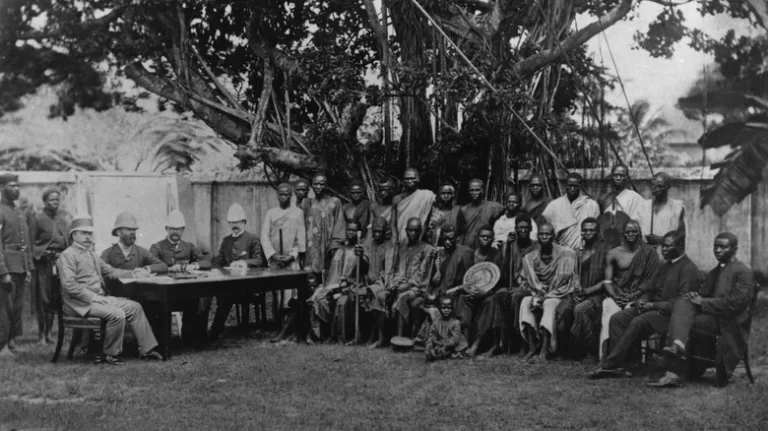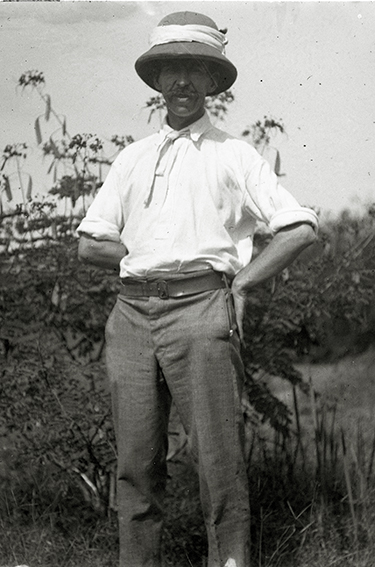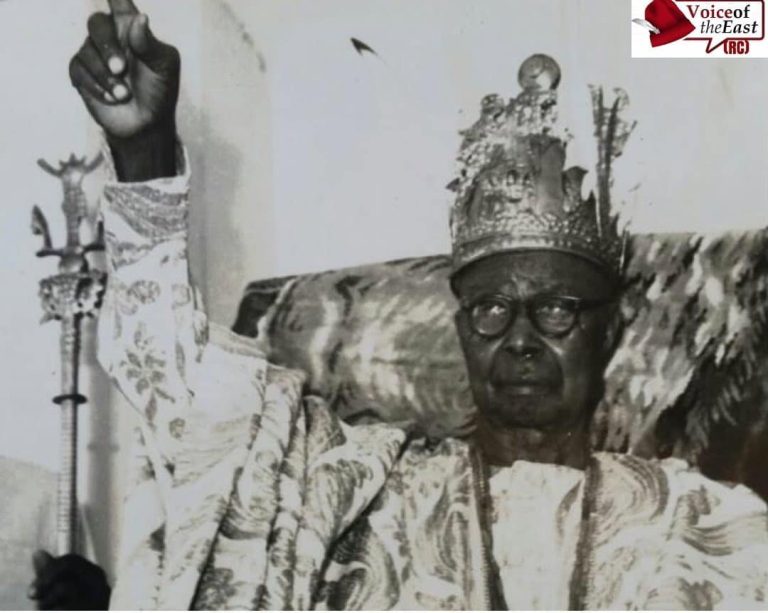The Anglo-Aro War (1901-1902) was more than just a military conflict; it represented a profound clash of cultures and ideologies. The Aro Confederacy, along with other southeastern Nigerian communities, fiercely resisted British colonial expansion for over two decades. According to Robert D. Jackson’s “The Twenty Years’ War,” this prolonged resistance involved over 300 battles and resulted in the loss of at least 10,000 Nigerian lives.
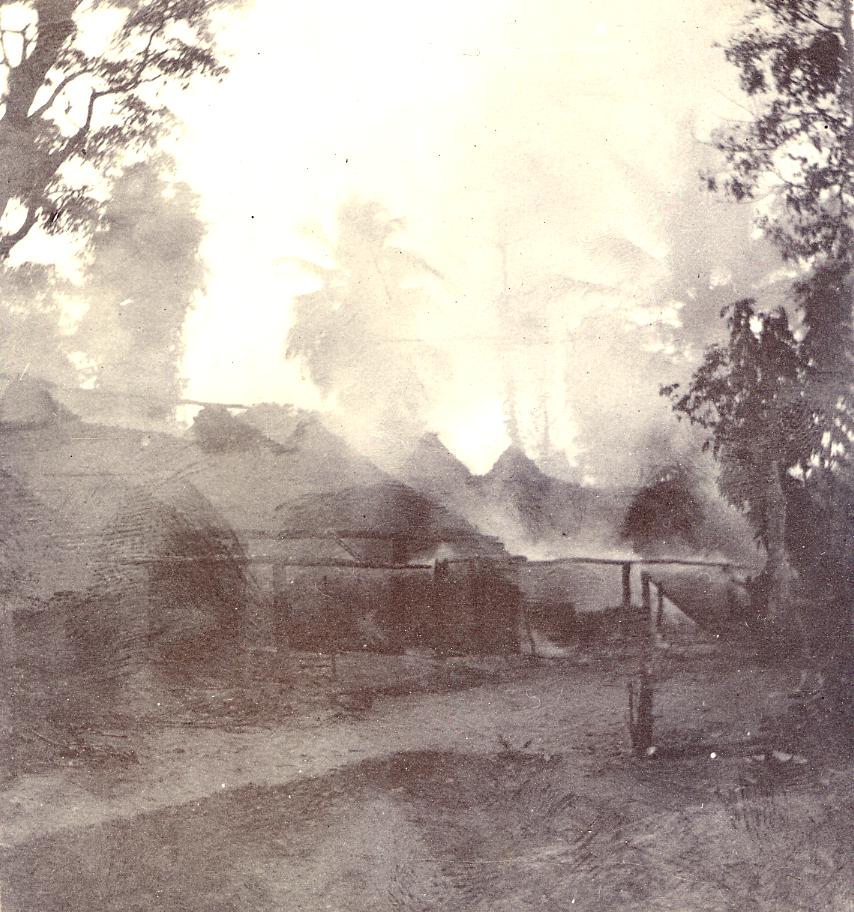
Background and Causes
The Aro Confederacy, established in the 17th century, was a formidable force in southeastern Nigeria. Known for their complex political system and dominance in the slave trade, the Aro posed a significant challenge to British colonial ambitions. Although the official British reason for the invasion was to stop the slave trade, the Aro had already begun transitioning to the palm oil trade by 1901. The true motive likely stemmed from a desire to control the region’s resources and trade routes.
The Aro did not have large standing armies; instead, they relied on mercenaries from neighboring communities like the Abam, Eda, Bende, Ohafia, and Abiriba. This unique system helped the Aro maintain their influence through trade and religious control. Their primary shrine, Ibini Ukpabi, housed the powerful oracle, Chukwu Abiama, attracting people from across the region seeking judgments. However, those condemned by the oracle were often sold into slavery through a network of middlemen.
The Course of the War
The British launched a well-coordinated military campaign against the Aro in November 1901, led by Lt. Col. Arthur Forbes Montanaro. The campaign involved a multi-pronged attack from Oguta, Akwete, Unwana, and Itu. Despite the Aro’s fierce resistance and strategic acumen, the British forces, equipped with superior firepower like the Maxim gun, eventually overpowered the Aro warriors. A significant turning point was the capture and destruction of the Ibini Ukpabi shrine in Arochukwu.
Major battles took place at various locations, including Oguta, Esu Itu, Arochukwu, Edimma, Ikotobo, and Bende, with the latter being decisive in sealing the British victory. The fall of Arochukwu in 1902 marked the collapse of the Aro Confederacy and opened southeastern Nigeria to further colonization.
Aftermath and Impact
The aftermath of the war saw the imposition of British colonial government in southeastern Nigeria, bringing significant changes to the region’s social structure and governance. The British introduced new administrative systems, altered traditional power dynamics, and sought to integrate the local economy into the global market, often at the expense of indigenous practices and autonomy. The disruption of trade routes and the collapse of the Aro Confederacy’s power marked the end of their economic and political dominance.
Legacy
Today, the Anglo-Aro War is remembered as a pivotal moment in the colonial history of Nigeria. It highlights the complexities of colonial conquest, the clash of cultures, and the enduring spirit of resistance among the Igbo people. The war also underscores the British use of anti-slavery rhetoric as a justification for their imperial ambitions, a tactic that was met with skepticism and resistance by the Aro and other local communities.
References
- Robert D. Jackson, “The Twenty Years’ War.” Available at: Archive.org
- Wikipedia, “Anglo-Aro War.” Wikipedia
- Africa Rebirth, “Exploring the Indigenous Religions and Spiritual Practices of Central Africa.” Africa Rebirth
- OnWar, “The British Aro Expedition of 1901-1902.” OnWar
Explore Further
For more on this topic, explore our recommended readings below. Each provides deeper insights and a broader perspective.
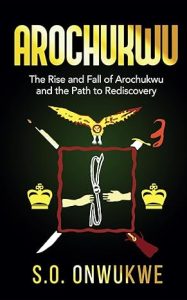 Recommended Books
Recommended BooksBook Details Title: AROCHUKWU: The Rise And Fall of Arochukwu And The Path To RediscoveryAuthor: Samuel Okoro OnwukwePublisher: Zoba’s FacilitiesPublication Date: December 27, 2023Format: PaperbackPages: 118ISBN-10: 9787841852ISBN-13: 978-9787841853Language: English Author Profile Samuel Okoro Onwukwe is an author who delves into the historical narratives of the Aro people, a group that played a pivotal role in […]
 Recommended Books
Recommended BooksOverview Arochukwu: A Patriarch’s Reflections is a collection of essays and books by the late George Moses Onwuchekwa. He was a barrister, historian, and expert on the customs and traditions of Arochukwu. Edited by Joseph Amaeze, this work provides an intimate look into the cultural and historical fabric of the Arochukwu people. It blends personal […]
Discover more from Igbo Archives
Subscribe to get the latest posts sent to your email.


